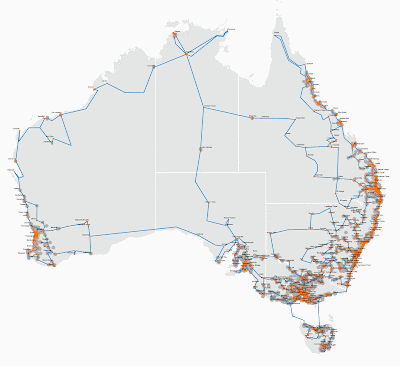Sunday 14 August 2011
Saturday 13 August 2011
Sometimes the young (and assorted others) make my heart sing - Part Four
Labels:
arts,
Australian society
Friday 12 August 2011
The highs and lows of public hospital outpatient care according to NSW consumers
Source: Outpatient care module of the NSW Health Patient Survey 2010
Click on graphs to enlarge
Click on graphs to enlarge
In August 2011 the NSW Bureau of Health Information released Patient Care Experiences (part of the Insight series) a survey of patients using outpatient services in NSW public hospitals during February 2010.
Not surprisingly, consumers on the North Coast had mixed feeling about their experience in the larger regional public hospitals and these scored in both the higher and lower satisfaction bands.
In comparison with all public hospitals in this survey, Murwillumbah and Grafton performed well and Tweed, Lismore and Coffs Harbour performed poorly.
When compared with other non-metropolitan hospitals in the survey most fell in the middle of the rating band with only Tweed Heads in the lowest ranking.
How the emergency department experience in non-metropolitan hospitals is rated by NSW Health can be found in Performance Profiles Emergency department care Major non-metropolitan hospitals Hospital Quarterly: January to March 2011.
Labels:
consumer choice,
health,
hospitals,
NSW government
Christopher Monckton splutters.....
Uploaded to YouTube by countrychannel99 on Aug 8, 2011:
One of the world's most prominent, and controversial, climate change skeptics, has been in New Zealand this week. Lord Christopher Monckton, the 3rd Viscount of Brenchley, is here as part of a world lecture tour promoting climate change denial. Reporter Benedict Collins met Christopher Monckton in Auckland, and while the Viscount might not believe in global warming, it didn't take long for the interview to heat up...
Labels:
climate change,
contrarian,
stupidity
NBN mapping for NSW North Coast
Go to NBN CO for interactive mapping showing national broadband coverage by anticipated type in each state and region.
Thursday 11 August 2011
Just how safe is the food we buy?
Number of food recalls coordinated by FSANZ,
shown by recall classification,
shown by recall classification,
between 1 January 2000 and 31 December 2010.
Number of recalls by food class
from 1 January 2000 – 31 December 2010
Click on graphs to enlarge
from 1 January 2000 – 31 December 2010
Click on graphs to enlarge
In April 2011 a Byron Bay business was fined $1,320 for the Sale of unsuitable food - Leptin Green Coffee 800 sold on internet - contained chemical agent, bis-Desmethylsibutramine, foreign to the nature of the food. This tea (along with leptin jelly and chocolate products) originated in China according to the NSW Food Authority and, six months earlier in October 2010 it was subject to recall in Australia.
This is not the first food recall of the year as I discovered when I went to the Food Standards Australia and New Zealand website where I found this sad window on the food we eat:
July
June
May
April
March
February
January
It would appear that food recalls in 2011 may possibly outstrip the 2010 total by the end of this year.
And you wonder why American society is going down the gurgler?
By-passing the electorate appears to be the norm in the good ol’ US of A which has gone a long way towards corporatizing ‘democracy’:
“At a workshop {held by the American Legislative Exchange Council (ALEC)} I attended, one Texas legislator, who moderated the forum, went as far as to say that that we are a big football team. The legislators are the football players and the corporate lobbyists and special interest group presenters are “our” coaches. {The Progressive 6th August 2011}
Wednesday 10 August 2011
A new national aged care policy is barrelling down the track towards Australia's baby boomers
The Gillard Government is assuring Australia’s baby boomers that the concerns bolded in red below will not occur:
Under this market price option, accommodation costs to high care recipients and taxpayers (the accommodation subsidy for supported residents) are likely to be higher, but consumer choice and industry sustainability would be enhanced. Care recipients, however, would continue to be charged differently according to the level of assessed care need (high or low care) not the standard of accommodation they have chosen. There is also a concern that, as providers could charge what the market would bear, care recipients could be exploited and those with a lower capacity to pay would miss out. This is a greater concern in the short term, particularly in areas where there is limited competition. [Productivity Commission,June 2011,Caring for Older Australians,Vol Two]
If you live in rural and regional areas perhaps it is time to carefully read the report and make up your own mind on what aged care policy should be before federal politicians make up theirs.
Subscribe to:
Posts (Atom)













